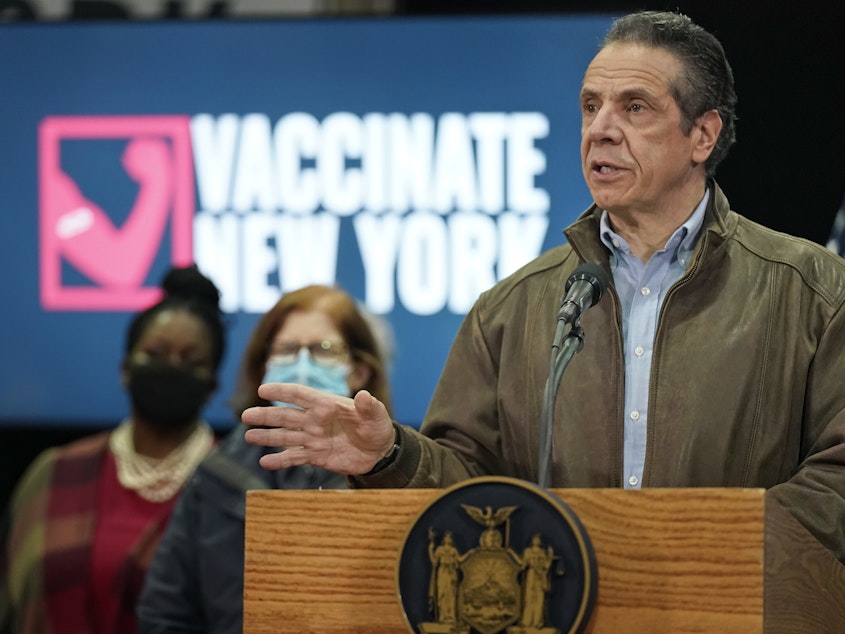New York Legislature Strips Cuomo Of Extraordinary Emergency Powers, With A Caveat

New York lawmakers voted to strip Gov. Andrew Cuomo of his extraordinary emergency powers on Friday, saying that current COVID-19 circumstances no longer justify the expansive powers Cuomo was granted last year. But the legislation also allows the governor to extend orders he has already issued.
New York's Senate and Assembly, both of which are led by Cuomo's fellow Democrats, approved the move on Friday. The Senate vote was 43-20; the Assembly vote was 107-43.
The votes took place as a pair of political crises are undermining the governor's standing. At least three women have accused Cuomo of sexual harassment, and his administration was found to have undercounted the coronavirus' horrible toll on nursing home residents. Those crises have fueled calls for Cuomo to resign, and for him to be impeached.
Earlier this week, Cuomo apologized for acting "in a way that made people feel uncomfortable," but he denied inappropriate conduct and refused to resign. The state's attorney general is conducting an investigation into the harassment allegations.
Several lawmakers who voted against the legislation Friday said they did so only because they believe it doesn't do enough to wrest power back from the executive branch.
Sponsored
"What more could this governor possibly do?" Republican Sen. Fred Akshar said, adding that Cuomo has issued some 96 orders during the pandemic. Approving the bill, Akshar said, "is worse than doing nothing."
The bill, which is identical in both chambers, allows the governor's COVID-19 directives to stay in effect for 30 days. But while it would stop Cuomo from issuing any new directives without lawmakers' approval, it also would allow the governor's existing directives to be extended.
The measure's supporters said it would be unsafe to suddenly lift all of the orders, noting that despite the arrival of vaccines, the pandemic isn't over. Cuomo has used the powers to enact a number of policies, from establishing capacity maximums for movie theaters to creating color-coded restriction zones and setting up quarantine restrictions for travelers.
But during Friday's debate, several lawmakers called for Cuomo's orders to be lifted immediately, and for him to face recriminations for his handling of the pandemic.
"I support impeachment," Democratic Assemblyman Charles Barron said, emphasizing that he doesn't think the legislation goes far enough to strip Cuomo of the special powers. Accusing Cuomo of obstruction and abuse of power, Barron said he would vote for both the Republican and the Democratic versions of the bill to rescind the emergency powers.
Sponsored
During debate on the bill, many lawmakers referenced the political turmoil Cuomo is now in. But as they discussed repealing the governor's emergency powers, many legislators also returned to a common theme: that their constituents are ready for their lives and businesses to start returning to normal.
"We demand to go back to work. We demand to send our children back to school," Republican Assemblyman Robert Smullen said, calling for his colleagues to repeal the law that granted Cuomo the powers last year.
The legislature gave Cuomo the extraordinary leeway to issue new orders last year, as New York faced a quick succession of challenges from the COVID-19 pandemic, which imposed unprecedented disruptions on everyday life in communities around the world.
But now, the bill states, "The legislature finds that there has been progress in the fight against the virus with the approval and distribution of multiple vaccines in recent months."
With the worst of the COVID-19 emergency now seemingly over, lawmakers said, it was time to restore the balance of powers.
Sponsored
"This is the last good chance we have to reassert ourselves as a legislature," Assemblywoman Marjorie Byrnes, a Republican, said.
The bill leaves intact any emergency powers the governor's office had before the pandemic. But it also says the legislature can terminate a state disaster emergency if both chambers approve a concurrent resolution. [Copyright 2021 NPR]


